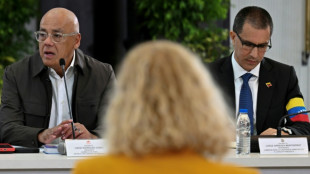
-
 NFL names 49ers to face Rams in Aussie regular-season debut
NFL names 49ers to face Rams in Aussie regular-season debut
-
Bielle-Biarrey sparkles as rampant France beat Ireland in Six Nations

-
 Flame arrives in Milan for Winter Olympics ceremony
Flame arrives in Milan for Winter Olympics ceremony
-
Olympic big air champion Su survives scare

-
 89 kidnapped Nigerian Christians released
89 kidnapped Nigerian Christians released
-
Cuba willing to talk to US, 'without pressure'

-
 Famine spreading in Sudan's Darfur, UN-backed experts warn
Famine spreading in Sudan's Darfur, UN-backed experts warn
-
2026 Winter Olympics flame arrives in Milan

-
 Congo-Brazzaville's veteran president declares re-election run
Congo-Brazzaville's veteran president declares re-election run
-
Olympic snowboard star Chloe Kim proud to represent 'diverse' USA

-
 Iran filmmaker Panahi fears Iranians' interests will be 'sacrificed' in US talks
Iran filmmaker Panahi fears Iranians' interests will be 'sacrificed' in US talks
-
Leicester at risk of relegation after six-point deduction

-
 Deadly storm sparks floods in Spain, raises calls to postpone Portugal vote
Deadly storm sparks floods in Spain, raises calls to postpone Portugal vote
-
Trump urges new nuclear treaty after Russia agreement ends

-
 'Burned in their houses': Nigerians recount horror of massacre
'Burned in their houses': Nigerians recount horror of massacre
-
Carney scraps Canada EV sales mandate, affirms auto sector's future is electric

-
 Emotional reunions, dashed hopes as Ukraine soldiers released
Emotional reunions, dashed hopes as Ukraine soldiers released
-
Bad Bunny promises to bring Puerto Rican culture to Super Bowl

-
 Venezuela amnesty bill excludes gross rights abuses under Chavez, Maduro
Venezuela amnesty bill excludes gross rights abuses under Chavez, Maduro
-
Lower pollution during Covid boosted methane: study

-
 Doping chiefs vow to look into Olympic ski jumping 'penis injection' claims
Doping chiefs vow to look into Olympic ski jumping 'penis injection' claims
-
England's Feyi-Waboso in injury scare ahead of Six Nations opener

-
 EU defends Spain after Telegram founder criticism
EU defends Spain after Telegram founder criticism
-
Novo Nordisk vows legal action to protect Wegovy pill

-
 Swiss rivalry is fun -- until Games start, says Odermatt
Swiss rivalry is fun -- until Games start, says Odermatt
-
Canadian snowboarder McMorris eyes slopestyle after crash at Olympics

-
 Deadly storm sparks floods in Spain, disrupts Portugal vote
Deadly storm sparks floods in Spain, disrupts Portugal vote
-
Ukrainian flag bearer proud to show his country is still standing

-
 Carney scraps Canada EV sales mandate
Carney scraps Canada EV sales mandate
-
Morocco says evacuated 140,000 people due to severe weather

-
 Spurs boss Frank says Romero outburst 'dealt with internally'
Spurs boss Frank says Romero outburst 'dealt with internally'
-
Giannis suitors make deals as NBA trade deadline nears

-
 Carrick stresses significance of Munich air disaster to Man Utd history
Carrick stresses significance of Munich air disaster to Man Utd history
-
Record January window for transfers despite drop in spending

-
 'Burned inside their houses': Nigerians recount horror of massacre
'Burned inside their houses': Nigerians recount horror of massacre
-
Iran, US prepare for Oman talks after deadly protest crackdown

-
 Winter Olympics opening ceremony nears as virus disrupts ice hockey
Winter Olympics opening ceremony nears as virus disrupts ice hockey
-
Mining giant Rio Tinto abandons Glencore merger bid

-
 Davos forum opens probe into CEO Brende's Epstein links
Davos forum opens probe into CEO Brende's Epstein links
-
ECB warns of stronger euro impact, holds rates

-
 Famine spreading in Sudan's Darfur, warn UN-backed experts
Famine spreading in Sudan's Darfur, warn UN-backed experts
-
Lights back on in eastern Cuba after widespread blackout

-
 Russia, US agree to resume military contacts at Ukraine talks
Russia, US agree to resume military contacts at Ukraine talks
-
Greece aims to cut queues at ancient sites with new portal

-
 No time frame to get Palmer in 'perfect' shape - Rosenior
No time frame to get Palmer in 'perfect' shape - Rosenior
-
Stocks fall as tech valuation fears stoke volatility

-
 US Olympic body backs LA28 leadership amid Wasserman scandal
US Olympic body backs LA28 leadership amid Wasserman scandal
-
Gnabry extends Bayern Munich deal until 2028

-
 England captain Stokes suffers facial injury after being hit by ball
England captain Stokes suffers facial injury after being hit by ball
-
Italy captain Lamaro amongst trio set for 50th caps against Scotland


Sci-fi writer Charles Stross' dark take on Silicon Valley 'religion'
Twenty years ago, British sci-fi author Charles Stross plunged readers into a head-spinning tale of mind uploading, the dismantling of the solar system and inhuman artificial intelligence masquerading as a cat.
Beyond an exhilarating story, Stross' 2005 book "Accelerando" was a thought experiment with ideas like transhumanism, technological "singularity" and rationalism -- concepts that had been circulating in Silicon Valley from the late 1980s -- and which many believe still animate powerful figures like Elon Musk and Peter Thiel.
"I was basically trying to bottle up all the future shock I was living with... on the edge of a nervous breakdown from dealing with an exponential growth curve" as an overworked programmer at a dotcom-era startup, Stross told AFP.
Originally published as a series of short stories, "Accelerando" went on to win a Locus Award, one of science fiction writing's major honours.
The novel follows three generations living through a "singularity" -- a theorised moment when technological progress accelerates to a pace beyond which almost anything becomes possible.
Among Stross' inspirations was "Extropians", a pre-social-media mailing list popular among techies that hosted discussions among "some interesting and very odd people... very much into self-improving AI, the singularity, cryonics, space colonisation... they had a strong libertarian bent," he remembers.
"Extropians" would also inspire figures like Ray Kurzweil, futurist and Google "AI visionary", who Stross believes "strip-mined" the conversations there for his books predicting the singularity.
Chapters of "Accelerando" track anarchic inventor Manfred, who struggles with relatable 21st-century problems like battles over digital copyright and remembering who and where he is without his smart glasses.
Another follows his daughter Amber, who uploads her mind into a computer to set off for another star system in the memory banks of a tiny starship.
The book also features Amber's son Sirhan, who lives in a solar system largely transformed into computing hardware to support ever-more uploaded minds and AIs.
- Silicon Valley religion -
Such out-there scenarios are central to what AI researcher Timnit Gebru and intellectual historian Emile Torres have dubbed "TESCREAL" -- short for "Transhumanism, Extropianism, Singularitarianism, Cosmism, Rationalism, Effective Altruism, and Longtermism".
In a 2024 paper, they described this "bundle" as one of the "ideologies driving the race to attempt to build Artificial General Intelligence" smarter than humans -- and traced its roots back to "the Anglo-American eugenics tradition of the 20th Century".
"TESCREAL is what you get when a bunch of relatively bright, technologically-interested former Christians... reinvent religion," Stross said.
"Christianity is a template for syncretistic religions" -- belief systems "which pick and match (ideas) from all over the place and glom them together," he added.
"TESCREAL is doing exactly the same thing with a bunch of technology-related memes."
Some statements and projects of today's tech titans echo this complex of beliefs, which foresees humans evolving beyond their present form, achieving immortality -- perhaps by merging with AI -- and multiplying throughout the universe.
Elon Musk, for example, has spoken about making humans a "multiplanetary" species, was one of the original backers of OpenAI's stated mission to develop "artificial intelligence (that) benefits all of humanity" and founded Neuralink, a brain implant startup that aims to one day "expand how we experience the world".
And OpenAI boss Sam Altman mused in a 2017 blog post about when humans would "merge" with machines, a process he believed "has already started" and "is probably going to happen sooner than most people think".
- 'Escapist fiction, big ideas' -
Stross said that with the likes of Musk close to power in the Trump administration and the threat of climate change hanging over the world, he is "fleeing screaming from writing about the near future".
With "reality around us going to hell in a handbasket," he sees his aversion to the present mirrored in readers' appetite for "cosy escapist stuff".
"I'm an entertainer... although I've always tried to do entertainment by combining regular escapist fiction with some big ideas," Stross said.
Two decades later, his writing is circling back to TESCREAL as he imagines a future where its promises go unrealised.
"What if there is not a singularity but everybody believes in it?" he mused. "What if we get half-baked versions of the tech?"
His current projects include a story in which humanity's far-future descendants "have religions... based on TESCREAL, and there are holy wars over who will be allowed to set the rules in the AI upload heaven that nobody's actually built yet."
Y.Zaher--SF-PST


